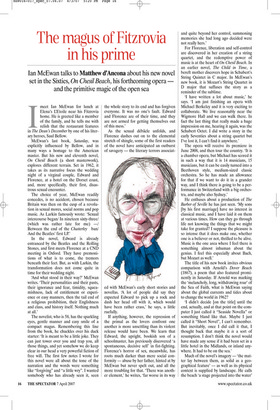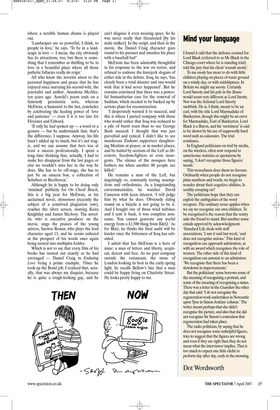The magus of Fitzrovia in his prime
Ian McEwan talks to Matthew d’Ancona about his new novel set in the Sixties, On Chesil Beach, his forthcoming opera and the primitive magic of the open sea Imeet Ian McEwan for lunch at Elena’s L’Etoile near his Fitzrovia home. He is greeted like a member of the family, and he tells me with relish that the restaurant features in The Dean’s December by one of his literary heroes, Saul Bellow.
McEwan’s last book, Saturday, was explicitly influenced by Bellow, and in many ways a homage to the American master. But his new and eleventh novel, On Chesil Beach (a short masterwork), explores different terrain. Set in 1962, it takes as its narrative focus the wedding night of a virginal couple, Edward and Florence, at a hotel on the Dorset coast, and, more specifically, their first, disastrous sexual encounter.
The choice of year, McEwan readily concedes, is no accident, chosen because Britain was then on the cusp of a revolution in sexual mores, social norms and pop music. As Larkin famously wrote: ‘Sexual intercourse began/ In nineteen sixty-three/ (which was rather late for me) —/ Between the end of the Chatterley ban/ And the Beatles’ first LP.’ In the novel, Edward is already entranced by the Beatles and the Rolling Stones, and first meets Florence at a CND meeting in Oxford. They have premonitions of what is to come, the tremors beneath their feet. But, as with Larkin, the transformation does not come quite in time for their wedding night.
‘And what stood in their way?’ McEwan writes. ‘Their personalities and their pasts, their ignorance and fear, timidity, squeamishness, lack of entitlement or experience or easy manners, then the tail end of a religious prohibition, their Englishness and class, and history itself. Nothing much at all.’ The novelist, who is 58, has the sparkling eyes, gentle manner and easy smile of a compact magus. Remembering this line from the book, he chuckles over his duck starter: ‘It is meant to be a little joke. They can just tower over you and trap you, all those things, and yet somehow we do keep clear in our head a very powerful fiction of free will. The first few notes I wrote for this novel were all about the tone of the narration and the words were something like “forgiving” and “a little wry”. I wanted somebody who has already seen it, seen the whole story to its end and has forgiven everyone. It was no one’s fault. Edward and Florence are of their time, and they are not armed for getting themselves out of this mess.’ As the sexual débâcle unfolds, and Florence dashes out on to the elemental stretch of shingle, some of the first readers of the novel have anticipated an outburst of savagery — the literary terrors associat ed with McEwan’s early short stories and novellas. ‘A lot of people did say they expected Edward to pick up a rock and dash her head off with it, which would have been rather crass,’ he says, a little ruefully.
If anything, however, the repression of the primal as the lovers confront one another is more unsettling than its violent release would have been. We learn that Edward, the upright, bookish son of a schoolmaster, has previously discovered ‘a spontaneous, decisive self’ in fist-fighting. Florence’s horror of sex, meanwhile, has roots much darker than mere social conformity — abuse by her father, hinted at by McEwan but never spelt out, and all the more troubling for that. ‘There was another element,’ he writes, ‘far worse in its way and quite beyond her control, summoning memories she had long ago decided were not really hers.’ For Florence, liberation and self-control are discovered in her creation of a string quartet, and the redemptive power of music is at the heart of On Chesil Beach. In an earlier novel, The Child in Time, a bereft mother discovers hope in Schubert’s String Quintet in C major. In McEwan’s new book, it is Mozart’s String Quartet in D major that suffuses the story as a reminder of the sublime.
‘I have written a lot about music,’ he says. ‘I am just finishing an opera with Michael Berkeley and it is very exciting to collaborate. We live reasonably near the Wigmore Hall and we can walk there. In fact the last thing that really made a huge impression on me, hearing it again, was the Schubert Octet. I did write a story in the early Seventies about a string quartet but I’ve lost it, I can’t find it anywhere.’ The opera will receive its premiere in June 2008, and then tour the country. ‘It is a chamber opera, but Michael has scored it in such a way that it is 14 musicians, 15 musicians, but it can be easily turned into a Beethoven style, medium-sized classic orchestra. So he has made an allowance for that if we want to do it in a grander way, and I think there is going to be a performance in Switzerland with a big orchestra, and maybe also Sydney.’ He enthuses about a production of The Barber of Seville he has just seen. ‘My sons [by his first marriage] have no interest in classical music, and I have laid it on them at various times. How can they go through life not knowing the things that we might take for granted? I suppose the pleasure is so intense that it does make one, whether one is a believer or not, thrilled to be alive. Music is the one area where I feel there is something almost inhuman about the genius. I feel this especially about Bach, but Mozart as well.’ The title of his new book invites obvious comparison with Arnold’s Dover Beach (1867), a poem that also featured prominently in Saturday. If Arnold was marking the ‘melancholy, long, withdrawing roar’ of the Sea of Faith, what is McEwan saying about the global currents and tides about to change the world in 1962?
‘I didn’t decide [on the title] until the end, actually, and at that point on the computer I just called it “Seaside Novella” or something bland like that. Maybe I just called it “Short Novel”, I can’t remember. But inevitably, once I did call it that, I thought back that maybe it is a sort of resumption. I don’t think the novel would have made any sense if it had been set in a little hotel in the Midlands, or inland anywhere. It had to be on the sea.’ Much of the novel’s imagery — ‘the matter lay between them, as solid as a geographical feature’ — as well as its physical context is supplied by landscape. He calls the beach ‘a stage projected into the water’ where a terrible human drama is played out.
‘Landscapes are so powerful, I think, to people in love,’ he says. ‘To be in a landscape in love — I mean, the city obviously has its attractions, too, but there is something that I remember as thrilling to be in love in a beautiful place where all those pathetic fallacies really do reign.’ All who know the novelist attest to the personal happiness and peace that he has enjoyed since marrying his second wife, the journalist and author, Annalena McAfee, ten years ago. Arnold’s poem ends on a famously pessimistic note, whereas McEwan, a humanist to the last, concludes by celebrating the healing power of ‘love and patience’ — even if it is too late for Florence and Edward.
‘If only he had spoken up — a word or a gesture — but he understands that, that’s the difference, I suppose. Anyway, his life hasn’t added up to much, but it’s not tragic, and we can assume that hers was at least a success professionally. I spent a long time thinking that, actually, I had to make her disappear from the last pages or else we wouldn’t miss her in the way he does. She has to be off-stage, she has to just be an unseen box, a collection of Schubert or Beethoven.’ Although he is happy to be doing only ‘minimal’ publicity for On Chesil Beach, this is a big year for McEwan, as his acclaimed novel, Atonement (recently the subject of a contrived plagiarism row), reaches the silver screen, starring Keira Knightley and James McAvoy. The novelist, who is executive producer on the movie, sings the praises of the young actress, Saoirse Ronan, who plays the lead character aged 13, and he seems unfazed at the prospect of his words once again being turned into multiplex fodder.
Which is not to say that every film of his books has turned out exactly as he had envisaged — Daniel Craig in Enduring Love being a prime example. ‘Once he took up the Bond job, I realised that, actually, that was always my disquiet, because he is quite a tough-looking guy, and he can’t disguise it even wearing specs. So he was never really that threatened [by his male stalker]. In the script, and then in the movie, the Daniel Craig character goes round to his pursuer and smashes his place with a baseball bat!’ McEwan has been admirably thoughtful in his response to the war on terror, and refused to endorse the kneejerk slogans of either side in the debate. Iraq, he says, ‘has clearly been a total disaster and one would wish that it had never happened’. But he remains convinced that there was a powerful humanitarian case for the removal of Saddam, which needed to be backed up by serious plans for reconstruction.
‘I desperately wanted it to succeed, and this is where I parted company with those who would rather that Iraq was reduced to a pile of burnt toast than to see George Bush succeed. I thought that was just parochial and cynical. I didn’t like to see murderous Zarkawi supporters slaughtering Muslims at prayer, or in market places, and be hailed by sections of the Left as liberators, freedom-fighters or even insurgents. The silence of the mosques here bothers me when another 80 people are killed.’ He remains a man of the Left, but inquiringly so, constantly testing assumptions and orthodoxies. As a longstanding environmentalist, he watches David Cameron with keen interest. ‘I will judge him by what he does. Obviously riding round on a bicycle is not going to be it. And I bought one of those wind turbines and I sent it back, it was complete nonsense. You cannot generate any useful energy from a £1,500 thing from B&Q.’ As for Blair, he thinks the final audit will be kinder once the bitterness of Iraq has subsided.
I admit that Ian McEwan is a hero of mine: a man of letters and liberty, sceptical, decent and free. As we part company outside the restaurant, the stone of London looking its best in the early spring light, he recalls Bellow’s line that a man could be happy living on Charlotte Street. He looks pretty happy to me.



































































 Previous page
Previous page